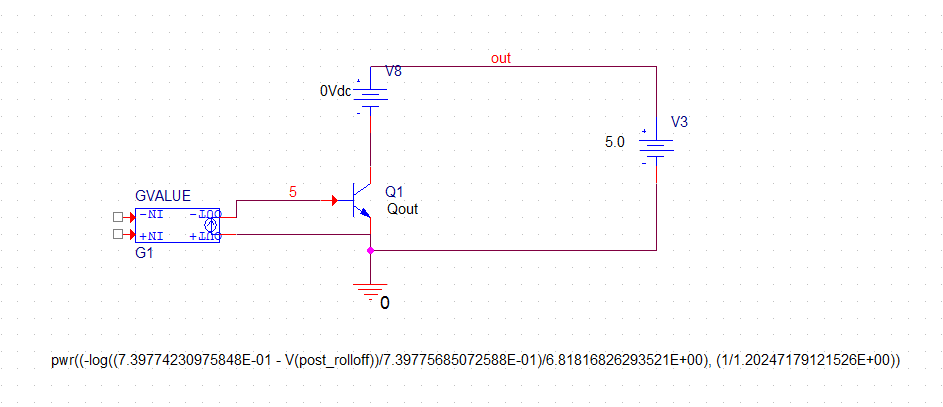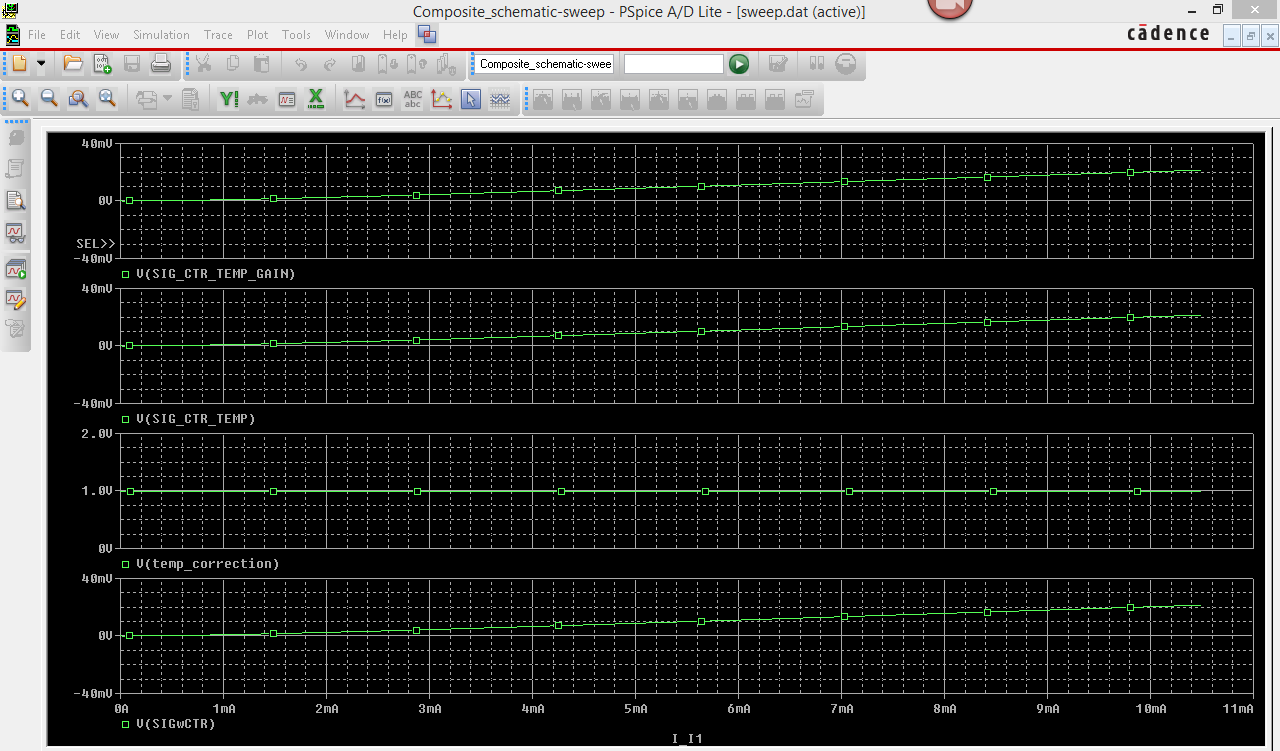
A Voltage Controlled Current source (G1) injects a current into the base of Q1. Notice that the transfer equation for the G1 is a complex equation involving power, ln and e. The PSpice Master’s Class covers how to generate these complex equations using regression software, and conversion of the result to a PSpice recognizable syntax.

These waveforms illustrate how to build a complex transfer function that include several, more simple transfer functions. This methodology can be used to create ‘calibration curves’ for corrections to the transfer function of your circuit, or can be used to simplify the building of more complex effects of your circuit, such as temperature effects and non-linear I-V relationships. The PSpice Master’s class covers how to go through this process, and end up with one G element in your schematic, with a complex mathematical transfer function that simulates quickly.
Interface Technologies’ PSpice Master’s Class is a custom configured advanced PSpice training class. We have been developing presentations on advanced areas of PSpice for over 30 years, and now offer these training modules in two flexible formats:
- “Ala carte” selection of subjects to be covered as an add-on day(s) to our two day on-site class
- Complete coverage of advanced subjects during our PSpice Master’s Class
The benefits of The PSpice Master’s Class include the following:
- Clear and logical presentation of subject matter – compiled from scattered source documentation
- Hands-on, interactive labs solidify the presentation with ‘real software’ experience
- Introduction to little known or poorly documented features and uses of PSpice
- Better understanding of PSpice component modeling
The Master’s class is conducted twice a year, as a two day ‘extension’ of the Introduction to PSpice with Schematic Capture class. It builds upon the fundamental skills learned in the Introduction class and pulls the user to a higher level of competence.
The PSpice Master’s Class Content
- Analog Behavioral Modeling Indepth Instruction
- Table Models
- Laplace Models
- Frequency Models
- Controlled Sources
- Controlled Sources with Expressions
- Probe
- Syntax for Waveform Searches
- Creating your own Goal Functions
- Recording and Replaying Macros
- Temperature Analysis
- How to verify if temperature is modelled in a device
- How to Specify Temperature in Spice
- Sweeping Temperature, analyzing results
- Advanced Component Modeling:
- Defining your own tolerance distribution curve
- Adding temperature effects to your passive devices
- Adding parasitics and frequency varying characteristics to R, L, Cs
- Transformer modeling:
- Linear transformers
- Multiple winding transformers
- Non-Linear transformers: (saturating cores)
- The Non-Linear core model
- Specifying core parameters
- Moving data into and out of your design:
- Moving your schematic into MSWord
- Moving your waveforms into MSExcel
- Importing oscilloscope waveforms for use in Spice simulations
- Using Probe data as an input to simulation
- Noise Analysis
- Overview of noise components
- Discussion of model parameters that affect noise
- Determine if noise is modelled in a device
- Running a noise simulation
- Viewing and using noise calculations
- Switch-mode power supply simulation
- Modeling the PWM with Behavioral models
- Overview of various circuit topologies
- Setting the Spice options for better convergence
- Using Intial Conditions
- Introduction to Op-Amp modeling
- Creating useful op-amp models based on the Boyle model
On-site Classes
The PSpice Master’s class, or portions of it, can be brought to your location and conducted on-site.
Typically, a discussion with the person coordinating the training will identify the subjects of particular interest. We’ll discuss what we need to cover in the Introductory class, and the elements of the Master’s class that are pertinent to the students. Once that is done, we’ll know the amount of time that the class will take, and the number of students. Then we can send a formal quote for the class.
This class, and portions of it, have been taught on 3 continents, and all across North America.
2025 Schedule for the PSpice Master’s Class
Classes are held twice annually in the United States. The cost for the two day Introduction to PSpice with OrCad Capture class is $1895/student, and includes the two days of training, lunch each day, an student copy of the PSpice software, and a certificate of achievement. The additional two days for the PSpice Master’s Class is $2100 per student. Students should sign up for 4 days of training, at $3995. per student.
If you want to attend the Master’s class only (the last two days, for $2100), please contact me, Dan Waterloo, so that we can go over the prerequisite skills.
| Subject | Class Dates | Location |
|---|---|---|
| The PSpice Master's Class | Sep 23-24 2025 | Austin TX |
or contact Dan Waterloo to discuss your requirements.
tel: +1 (708) 366-4411
email: dan@i-t.com
